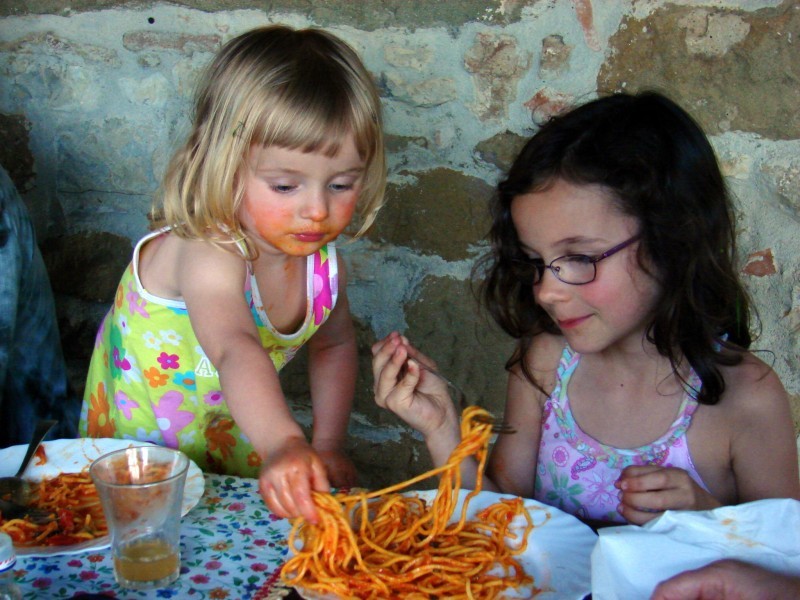Same Food - Recipe for Trust and Cooperation

How to improve mutual understanding with the girl on the first date or to rally the working team? Colleagues will give a lot of advice on this matter, but most likely they will lose sight of one fairly simple technique, the effectiveness of which is now scientifically proven .
Researchers at the University of Chicago conducted a series of experiments to determine if there is a correlation between choosing the same food and a sense of trust and closeness between adults. The research results are published on June 25, 2016 in the Journal of Consumer Psychology .
It is intuitively clear that if people want to be similar to each other, if they show empathy, if they have the same habits, hobbies, etc., such people feel greater trust and closeness to each other. But even the most "intuitive" statements require scientific verification.
')
Recently, scientists have shown that joint laughter is an extremely important “social glue” that allows you to build intra-group communication. If a person laughs at your jokes, then he feels sympathy for you.
Choosing the same meal plays a similar role. During the first experiment, specialists from the University of Chicago randomly assigned participants to the experiment in pairs, where they played an investment game - the standard scientific method for measuring the degree of trust . The participants of such a game determine the amount of money they are willing to share with a partner. Under the terms of the experiment, this money is “invested”, that is, doubled. The investor has no guarantee that the recipient will return some part of the amount back. He has the right not to return anything at all. Therefore, the investor determines how much money to allocate for investments to a partner with an unknown outcome, and which part is guaranteed to be kept. Accordingly, the amount of money that a participant is willing to give to a stranger indicates the degree of trust between them.
During the experiment, some couples were offered to eat the same candies, while others were different. Accordingly, two experimental groups were formed, the results of which could be compared with the third control group that did not receive sweets.
The experiment showed that the maximum degree of trust is established between participants who had previously eaten the same candy.
In the second experiment, scientists set the task of confirming the effect of the same food on increasing the degree of trust. Here they used another verification method. The participants did not cooperate in pairs, but confronted each other in "negotiations on a labor contract." Some couples were given the same food before starting negotiations, while other couples were given different food. The result was even more impressive: couples with the same food reached an agreement almost two times faster than those who ate different foods.
“People tend to think that they make decisions through logic, and they often do not realize that eating habits can influence their thinking,” said Ayelet Fishbach, a professor at the business school at the University of Chicago. “At the most basic level, food can be used with the strategic goal of helping people collaborate and establish trust.”
Such techniques are easy to practice. For example, at large business meetings or in working canteens, you can limit the possible range of dishes, encouraging people to choose the same food. Theoretically, this should increase the efficiency of labor in the company at the expense of greater trust and cooperation.
For personal use, men and women can use this technique, for example, on a date, or for reconciliation after a quarrel. Of course, it is desirable to use such techniques only after notifying the partner, otherwise it will be a manipulation.
The scientific article “A recipe for friendship: Similar food consumption will promotes cooperation and cooperation” will be published in the January issue of the Journal of Consumer Psychology (doi: 10.1016 / j.jcps.2016.06.003), while an unedited manuscript is available online for $ 35.95 or for free .
Having proved the correlation between choosing the same food and trust, the scientists tried to find the same effect of other factors. For example, in one of the experiments a third-party observer had to assess how much people in shirts of the same color and different color trust each other. It turned out that the influence of the choice of color on the degree of confidence is much less than the influence of the choice of food.
“I think food is so important because it’s something that we take inside the body, and we need to have confidence to do it,” says Professor Fischbach. “I hope our research will help bring people together and will help resolve conflict situations.” In the future, scientists want to test how much the trust affects the act of sharing food, when one person gives part of his portion to another.
Source: https://habr.com/ru/post/369463/
All Articles